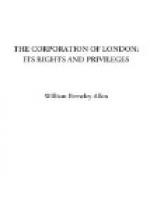The conservancy of the Thames is another of the responsible duties of the Corporation. For all purposes of navigation the river is admirably adapted by nature, and improved by the thoughtful vigilance of its conservators. As a navigable river the Thames is actually in a better condition at the present day than at any period of its past history, a remark that cannot be applied to any other tidal river in the world. As for the filthy and polluted character of its waters, that at least cannot be laid to the charge of the Corporation. So far back as the year 1842 the City authorities issued a commission to survey and report upon the state of the Thames, and in accordance with the report of those gentlemen proceeded to take measures for embanking the river so as to prevent the deposit of mud on the banks, to deepen the channel, and to improve the wharfage. Strange to say, these spirited proceedings in the interest of the entire metropolis drew down upon the Corporation the wrath of the “Woods and Forests.” The foul fermenting accumulations of putrescent matter which send forth the pestilential exhalations that engender so much disease, are declared to be the property of the Crown, as “seised of the ground and soil of the coasts and shores of the sea, and of all the navigable rivers within the flux and reflux of the tide throughout the kingdom.” Thanks, therefore, to this precious prerogative of the Crown, her Majesty’s lieges have for the last fifteen years continued to be poisoned “by virtue of the common law,” while the Corporation have been punished by the infliction of a suit in Chancery for seeking to cleanse the river and purify the atmosphere, without first invoking the wisdom of the “Woods and Forests.”
If the crown lawyers be correct, it will follow that the entire seaboard of Great Britain and Ireland is the actual property of the Crown, as well as all lands reclaimed from the sea, and that all other manorial rights are purely imaginary and unfounded.
Hitherto the tonnage rates levied on vessels in the port of London are admitted to have been as moderate as was consistent with the due maintenance of the port. The citizens, being themselves engaged in trade, have always been interested in holding out inducements for the shipping of all nations to frequent their port, and have thus systematically reduced the tonnage dues to the lowest possible scale. The Government, however, looking only to the actual amount of revenue to be obtained, intimate the probability of a future augmentation of these dues. The effect of even a trifling increase will naturally be to divert a portion of the trade to other ports, and to inflict a proportionate amount of injury on the port of London. Such will be the first fruits of Government interference, such the inevitable result of superseding customs and usages which have grown out of the character of the Anglo-Saxon race.
City Receipts.




